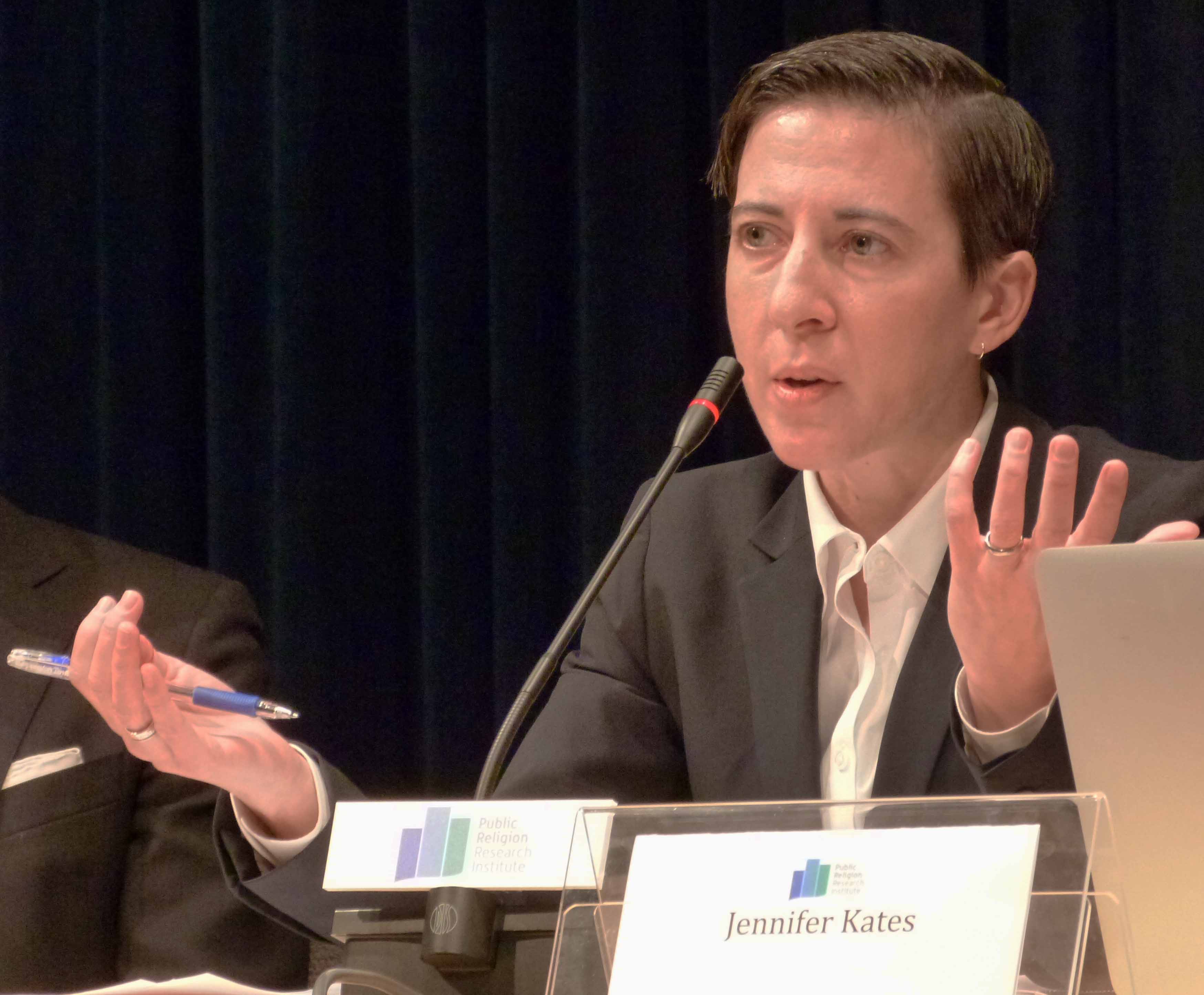
Dr. Jennifer Kates speaks on a panel about the implications of PRRI’s same-sex marriage and LGBT issues survey during its release at the Kaiser Family Foundation.
Dr. Jennifer Kates is vice president and director of global health and HIV policy at the Kaiser Family Foundation. She appeared as a panelist at the release of PRRI’s latest survey, A Shifting Landscape: A Decade of Change in American Attitudes about Same-sex Marriage and LGBT Issues, and later sat down with PRRI senior editor MacKenzie Babb to discuss the findings.
What are your key takeaways from the survey?
This is one of the largest and most comprehensive surveys on attitudes toward LGBT issues and LGBT Americans that’s ever been conducted, so it’s an incredibly rich source of new information. The fact that it is also able to provide some state-specific information as well as a look at the attitudes of self-identified LGBT individuals make it a very rich new data source. So overall, it’s a very significant contribution to the field of research on these issues. And I think the general finding that the public has really moved so significantly in its support for same-sex marriage to a consistent majority in favor of allowing gay and lesbian couples to legally marry across many surveys shows a pretty phenomenal shift over a relatively short period of time. The findings from this survey can really help us understand the variation in support for things like same-sex marriage and non-discrimination laws by factors like age, geography, religion, and gender, and that level of depth is really important.
Which of the survey’s findings most intrigues you?
People perceive that others in their groups, and others in society as a whole, are less accepting than they are. For example, we know that a majority of Americans support same-sex marriage, but Americans overall think a majority actually opposes allowing gay and lesbian couples to marry legally. So, there’s a real disconnect between perceptions of support and opposition and the reality, and I think it’s important to examine how we may bridge that disconnect. But you saw that same gap in the opinions of many, many groups, and it was particularly striking for those who oppose same-sex marriage who are much more likely than other groups to inaccurately believe that majorities of other Americans also oppose same-sex marriage.
What are the implications of a survey like this for the future of LGBT rights in America?
One finding of this report that really hits solidly is that most people do not support discrimination against LGBT people. As has been found in some other studies and is clearly shown in PRRI’s report, most Americans across demographic groups support employment protection for gay and lesbian people. And at the same time, people hold misperceptions about the protections currently in place. Most mistakenly believe there is a law protecting people from being fired from their jobs for being gay or lesbian or transgender, even though there is currently no such a law at the federal level. So the finding that most people not only support such a policy, but already believe it exists, is a really important finding. It’s an important piece of information to add to the current debate over creating such a policy nationally.
Finally, as an expert on HIV/AIDS, were you surprised by any of the survey’s findings on Americans’ perceptions surrounding the disease?
Well, the report shows that the old views that HIV was some kind of moral punishment, or God’s punishment, are a minority view now. Science has prevailed, and people understand how HIV is transmitted and thus no longer hold that view. At the same time, when you ask Americans whether someone infected with HIV became infected through no fault of their own or through irresponsible behavior, two-thirds say it’s through irresponsible behavior. HIV transmission is a very complex thing and so that view is a real challenge for public health practitioners as well as for policymakers to help raise awareness and address the epidemic in this country and elsewhere.
Interestingly, while Americans are more likely to believe people in the United States living with HIV/AIDS became infected because of irresponsible behavior rather than through no fault of their own, the survey shows Americans hold the opposite beliefs about people living with HIV/AIDS in developing countries; most believe those people became infected through no fault of their own. Why might this be?
One potential reason could be that people think that in the United States everyone has more access to information about HIV and has received more education. Whether or not this is true in all cases, it might be the perception that Americans should have this information and therefore should know better, while perhaps individuals in developing countries haven’t had the same access to information about HIV and should thus not be faulted.